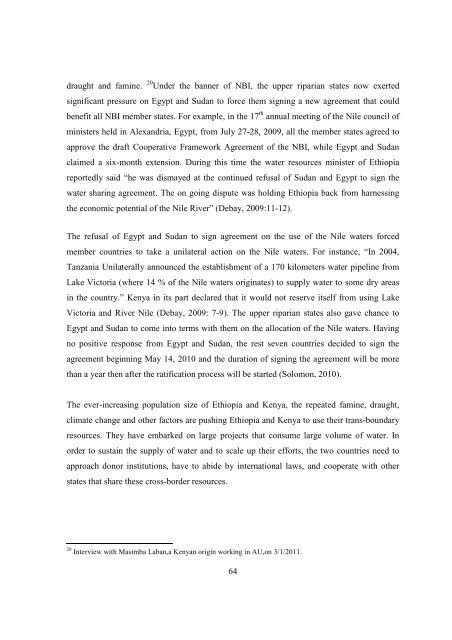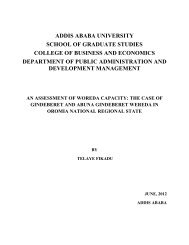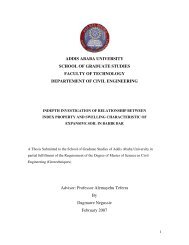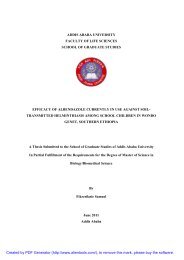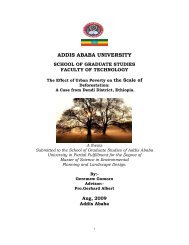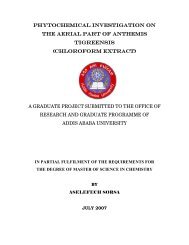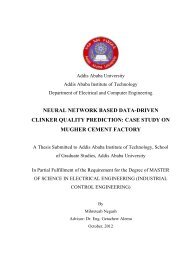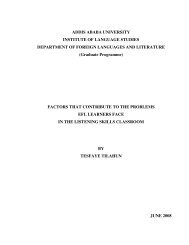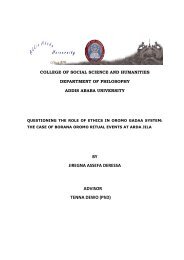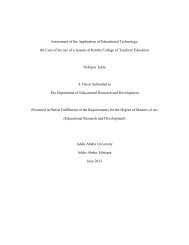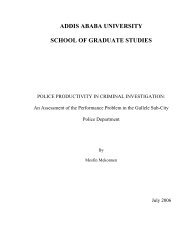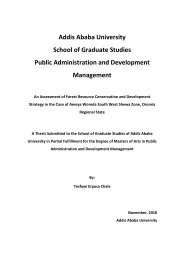HENOK MERHATSIDK 1.pdf - Addis Ababa University
HENOK MERHATSIDK 1.pdf - Addis Ababa University
HENOK MERHATSIDK 1.pdf - Addis Ababa University
Create successful ePaper yourself
Turn your PDF publications into a flip-book with our unique Google optimized e-Paper software.
draught and famine. 20 Under the banner of NBI, the upper riparian states now exerted<br />
significant pressure on Egypt and Sudan to force them signing a new agreement that could<br />
benefit all NBI member states. For example, in the 17 th annual meeting of the Nile council of<br />
ministers held in Alexandria, Egypt, from July 27-28, 2009, all the member states agreed to<br />
approve the draft Cooperative Framework Agreement of the NBI, while Egypt and Sudan<br />
claimed a six-month extension. During this time the water resources minister of Ethiopia<br />
reportedly said “he was dismayed at the continued refusal of Sudan and Egypt to sign the<br />
water sharing agreement. The on going dispute was holding Ethiopia back from harnessing<br />
the economic potential of the Nile River” (Debay, 2009:11-12).<br />
The refusal of Egypt and Sudan to sign agreement on the use of the Nile waters forced<br />
member countries to take a unilateral action on the Nile waters. For instance, “In 2004,<br />
Tanzania Unilaterally announced the establishment of a 170 kilometers water pipeline from<br />
Lake Victoria (where 14 % of the Nile waters originates) to supply water to some dry areas<br />
in the country.” Kenya in its part declared that it would not reserve itself from using Lake<br />
Victoria and River Nile (Debay, 2009: 7-9). The upper riparian states also gave chance to<br />
Egypt and Sudan to come into terms with them on the allocation of the Nile waters. Having<br />
no positive response from Egypt and Sudan, the rest seven countries decided to sign the<br />
agreement beginning May 14, 2010 and the duration of signing the agreement will be more<br />
than a year then after the ratification process will be started (Solomon, 2010).<br />
The ever-increasing population size of Ethiopia and Kenya, the repeated famine, draught,<br />
climate change and other factors are pushing Ethiopia and Kenya to use their trans-boundary<br />
resources. They have embarked on large projects that consume large volume of water. In<br />
order to sustain the supply of water and to scale up their efforts, the two countries need to<br />
approach donor institutions, have to abide by international laws, and cooperate with other<br />
states that share these cross-border resources.<br />
20 Interview with Masimba Laban,a Kenyan origin working in AU,on 3/1/2011.<br />
64


